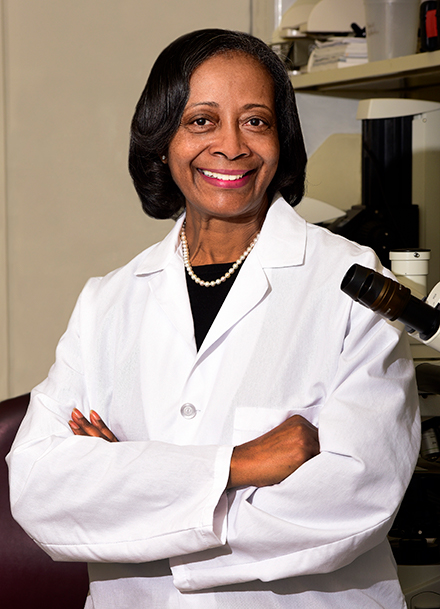Darlene Dixon

Power Words
Where were you born?
New Jersey
What school did you attend?
Tuskegee University (BS), Tuskegee University College of Veterinary Medicine (DVM), Michigan State University (PhD), Postdoctoral Fellow, LARC, The Rockefeller University
What IC do you work for?
The National Institute of Environmental Health Sciences (NIEHS)
How many years have you worked at the NIH?
31 years
What gained you interest in the NIH?
As a postdoctoral fellow, I had the opportunity to come to NIEHS to visit and was impressed with all of the basic science research opportunities in addition to the environmental health and toxicology focus of the Institute.
What kind of work do you do at the NIH?
I'm a researcher and toxicologic pathologist at the NIEHS/NTP.
What message would you like to send to young Blacks who are considering going to college?
Stay positive and never give up. Times may get tough, but know that you are working towards a greater good. In the end, all of the sacrifices will be well worth it.
Why did you choose to pursue a career in research?
I was always interested in understanding disease processes and what happens within a cell or an organ that results in an abnormal state or disease. While in graduate school, I majored in pathology with a minor in environmental toxicology, which fostered my interest in not only understanding the pathogenesis of disease processes, but also trying to understand the role of the environment and environmental exposures on disease and human health. As a postdoctoral fellow I was involved in research projects that allowed me to explore science at a very basic molecular level that drew my interests towards trying to understand the molecular perturbations that occur in a cell or an organ that manifest in disease.
What would you say is your most significant contribution to science or medicine?
Defining molecular events that occur in uterine fibroids that are important in fibroid cell growth. Identifying, growth factors, growth factor receptors, and nongenomic signaling mechanisms and molecular targets that are important in the pathogenesis of uterine fibroids. Developing an in vitro fibroid cell model that has been used world-wide by researchers. Showing that environmental estrogenic agents (genistein in soy, cadmium, BPA) can impact uterine fibroid cell growth. Also, delineating the life cycle of the uterine fibroid myocyte to help understand the etiology and pathogenesis of uterine fibroids.
Regarding your career here at NIH, what accomplishment are you the most proud of?
Mentoring wonderful trainees from the US and from all over the world who have become great research scientists, physicians, physician scientists, pharmacists, pathologists, toxicologists, veterinarians, all contributing to making the world environmentally safe and healthier. Also, inspiring and motivating young underrepresented minority students to consider pursuing a career in science and biomedical research. Sharing the joys of research and allowing junior scientists to be creative in asking great research questions and designing experiments to address those questions. I think being a mentor has been my greatest accomplishment.




